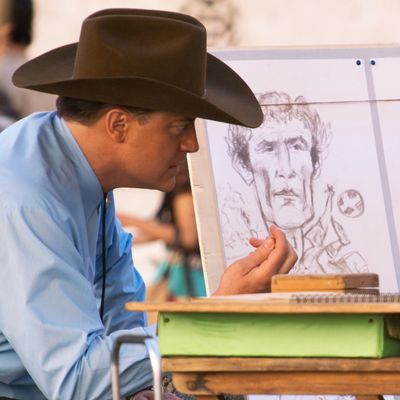
“When you have everything you could dream of, what do you value? Nothing.” — John Paul Getty II
The first episode of Trust focused heavily on John Paul Getty and his grandson, John Paul Getty III. In a parallel structure, the second episode introduces us to another pair of key players in this scandal: Hilary Swank’s Gail Getty and Brendan Fraser’s Fletcher Chace. Both actors are perfectly cast, and both characters spend the bulk of “Lone Star” trying to discern what the hell is going on with the young Paul. His girlfriends found a ransom note alleging that he’s been kidnapped, but it didn’t ask for money and no one seems to know much of anything about where he is or what his kidnappers want.
“Lone Star” is a wonderfully directed episode, as Danny Boyle plays with split screens reminiscent of the filmmaking of the era in which this mostly true story takes place. He’s even more playful with Fraser’s larger-than-life cowboy, plunking down the performer in cobbled Italian streets with a cowboy hat, a bolo tie, and a country twang. He’s a fascinating fish out of water, and yet he seems to be in control of every situation. Fraser may end up stealing Trust entirely.
Although Fletcher appeared briefly in the premiere, this is his episode in no small part because he speaks directly to the camera. His monologue is about how different years in history bring to mind different events and feel “bigger” than others: 1945, 1963, 1969 — these are major years. 1973? Not so much. Not only is it a wonderfully directed and performed scene, it’s a commentary on the show itself. By breaking the fourth wall to discuss memory, Boyle and writer Simon Beaufoy are making it clear that this story is not meant to be taken 100 percent seriously. It’s exaggerated, as the events that Fletcher describes become memories.
Before Fletcher gets to Rome, we meet Paul’s mother Gail and the horrible man she’s living with. She wants to call the elder John Paul immediately to ask for his help, both in terms of the power he wields and the financial backing he brings. As the rest of the Gettys find out that Paul has been kidnapped, they respond in different ways. John Paul seems concerned about his own safety, ordering bars put on the windows, while Junior seems to be more upset about the public shame this might bring than his own son’s well-being. Junior can’t go to Rome, and so Fletcher is sent to bring Paul home.
Before he’s even in his hotel room, Fletcher is waving that Getty fortune around. He drops some money on the bellhop and tells him to let the mafia know that he wants to talk. He speaks to the cops, who barely care, insisting that kidnappings usually resolve themselves. It’s a very chill Italian aesthetic with blowing fans and little actual concern. The lack of worry leads Fletcher to quote some truly terrifying scripture, but Fraser does so with such a twang and a smile that it’s almost charming.
Fletcher learns that Paul hasn’t been living with his mother or siblings. He wanted his independence. When his girlfriends show up, Fletcher starts feeling pretty suspicious. Their defensiveness doesn’t help. There’s been no ransom demand yet, and everyone finds that odd. What is actually going on here?
The investigation takes Fletcher to a café with paintings by Paul. He was clearly a regular and used the paintings for food and drink. Fletcher hangs out until close and then drops some cash on the owner, handing off a suitcase full of money. The public story of Trust, as captured in All the Money in the World, is how much one of the richest men on the planet refused to pay for the return of his grandson, so it’s interesting to see his hired man use Getty money to the tune of what looks like millions of dollars to get him back. When it’s under the radar, there’s no price tag too high. When it’s public, there’s not one too low.
Bribing the bellhop appears to work, too: Fletcher is told to meet someone out front at 8 p.m. He’s taken through the streets of Rome to a tunnel with some sketchy guys. Another interesting aspect of Fletcher Chace? He doesn’t look remotely concerned for his own safety. While Gail and Paul’s siblings are excited about the return of the rebel in the family, Fletcher learns the truth: No one in power in Rome has any idea what happened to him. They even give Fletcher back the suitcase of money. Uh oh. “Nobody has him,” one of the men says.
And so, Fletcher’s investigation shifts. He tries to track down the people Paul knows best, leading him to a caricaturist, who directs him to the woman we saw Paul kissing at the end of last week’s episode. Before that interaction, Fletcher finds a diary of film shots and storyboards, and a program for the movie Travels With My Aunt. He goes to see the movie and a light bulb goes off in his head: Both the movie that Paul saw recently and the one he was writing feature a fake kidnapping. And then the woman from the club really drops the hammer: The scene we saw at the end of the first episode took place after the alleged kidnapping. Paul was out, dancing and having fun. He still could be. Fletcher concludes there is no kidnapping, or that Paul staged it himself. And he leaves.
John Paul seems almost impressed by his grandson’s ambitious plan, but considers the absolute protection of his dynasty above all else. If this plan were to work, kidnappers would target the other Getty children and grandchildren. And so, John Paul calls a press conference in which he lays down the law, promising, “I will not be paying a single solitary cent.”
Despite all of the evidence, Gail remains suspicious. She goes to the club and the square where we saw Paul taken. A living statue tells her the story of what we saw: Paul knelt at the fountain, then men put a hood over his head. She goes home and kicks out the unsupportive man in her life as Chace gets back to his flat in England, reminding us that this mess is only getting started. We see an overhead of a hooded figure, as we hear Paul crying.
Other Notes
• The score for Trust is fantastic, especially the way it presents themes for its characters, such as the twangy bass that accompanies Fletcher Chace around Rome. It’s composed by James Lavelle, who was a founding member of the awesome UNKLE and has worked with Queens of the Stone Age, Radiohead, Beastie Boys, Massive Attack, and Oasis.
• When Junior speaks to his father, they discuss why Junior can’t go to Rome. It’s related to the death of his second wife, Talitha Pol: Her demise in 1971 was ruled due to cardiac arrest, but it’s been reported since that it was a heroin overdose. It was apparently an addiction that Junior and his wife shared, and the investigation and rumors are likely why he couldn’t go to Italy himself after his son was kidnapped.
• Did you recognize that wacky song Gettys listen to on their way back to Rome? “Prisencolinensinainciusol” was also used brilliantly in last year’s Fargo.
• Pay close attention to the movie preview for Travels With My Aunt. It stars Maggie Smith!
• If you haven’t read it yet, don’t miss this brilliant profile of Brendan Fraser in GQ.


